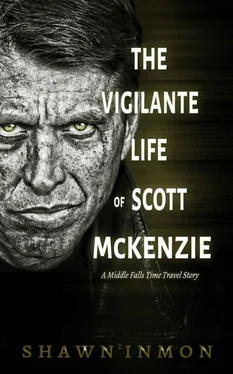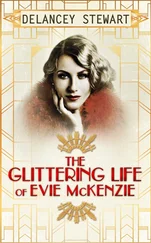When he was half a day away from Evansville, he called home from a payphone to let them know what time he would be in, barring any breakdowns, traffic, or major storms.
When the bus finally rolled into Evansville, Scott was glad to get off the bus. It had gotten him there, but sitting in one position for that long didn’t agree with his injured body. He limped off the bus and looked left and right, expecting someone might be there to greet him. He turned up the collar of his green army-issued coat against the wind and spitting snow. He didn’t recognize anyone. He tipped the driver a buck to haul his suitcase inside the depot for him, then sat and waited.
The inside was like every other bus depot across America in the early 70s—dingy, with dirty tile floors, molded-plastic seats attached to each other, and a sense of despair that hung in the air. Bus stations were the dropping off point of the lower middle class and poor. In large cities, hustlers flocked to them to find marks who were literally fresh off the bus from Kansas, or Iowa, or any of the other flyover states. Evansville wasn’t big enough to attract any of that. It just smelled of too many weary travelers and too little disinfectant.
Scott took all this in, then fixed his eyes on the two sets of double doors that led inside and waited.
I talked to both Cheryl and Gram. There’s no way they’d forget about me. I could call them again, but I think instead, I’ll just wait.
Snow was swirling in tiny cyclones on the ground, but not so much that the roads would be difficult. If he had learned anything in his two years in the army, though, it was how to wait patiently.
When he first sat down, the neon clock over the doors had read 3:22. By the time it read 5:15, it was almost dark outside.
Suddenly, Cheryl burst through the doors, looking frantically for Scott. He raised his hand to wave, but she had already spotted him and before he could get up out of his seat, she had crossed the room and threw her arms around him.
Her words came in a rush. “Oh, Scotty, I’m so sorry. Today was all about you. Gramps and I painted your room and were getting it ready for you, but just when we were coming to get you, Gram fell. She didn’t slip and fall. She was walking across the kitchen, then she was down. She wasn’t unconscious, exactly, but she wasn’t making sense, either. We called the ambulance, and then followed it to the hospital. That’s where we’ve been, trying to find out if she’s going to be okay. I’m so sorry we weren’t here to get you…” Hot tears spilled and ran down her cheeks. “Oh, Scotty, look at you. You’re so thin. Haven’t they been feeding you?”
Scott ignored the question and tried to process the speech his sister had delivered. Trying to slow Cheryl down a little, he said, “Help me with my duffel, will you? If I carry it, it throws me off balance. I’m not walking too great yet.”
She tilted her head and a look of profound sadness passed over her face as the reality of her wounded brother sank in. Scott had always been her warrior, her protector. Now he was frail and broken. Intellectually, she had known how badly he had been injured. Now it sank into her heart. She brushed her tears away and did her best to smile at Scott. “Right. Come on, let’s get back to the hospital.”
She picked up his duffel bag, which wasn’t heavy, then slipped her other arm around Scott’s waist. Scott did better with his walking when left alone, but it felt so nice, he didn’t say a word.
Outside, the snow had picked up and they drove to the hospital in a kaleidoscope of oncoming flakes.
Scott glanced at Cheryl as she drove. When I left, she was still a girl. Now, she’s definitely a young woman. She didn’t even have her license yet then. Now look at her, driving through a snowstorm like a pro.
“I know you probably won’t want to talk about it when Gram and Gramps are around, but how bad was it?”
I don’t want to talk about it when anyone is around, sis. I can’t tell you that, though, because we always told each other everything.
“The war is hell, but being in a veteran’s hospital is so much worse. I’d rather die than go back there.”
“Scotty!”
Scott shrugged. “I didn’t say I’m ready to jump off a bridge. I just could never go through that again. You know when you go to the pound and see all the abandoned cats and dogs? It’s a little like that, but it smells worse.”
Cheryl wrinkled her nose. “I’m so sorry this happened to you. We’ll get Gran patched up and nurse both of you back to health. Everything will be good again.”
It doesn’t feel like it will ever be good again.
They found a spot inside the parking garage, which Scott was grateful for. He hadn’t been forced to try out his newfound balance on slippery walkways yet.
Inside the hospital, they hurried as best they could down the long corridors and into a shared room.
Scott leaned over and kissed his grandmother’s cheek. Her eyes fluttered open, a mixture of fear and surprise in her eyes.
“Oh, Scotty, oh my boy. Give me a hug!”
Scott did his best. Between his partially functioning arms, and her palsied, shaking hands, they wrapped each other in an awkward embrace.
Gran held Scott’s face and looked deep into his eyes for long moments. She looked past his eyes and into his soul. Finally she said, “Oh. Oh, Scotty, I am so sorry.”
When she released him, Scott walked to his grandfather, who appeared unchanged from the last time he had seen him, and hugged him, too. The old man held Scott out at arm’s length, then shook his head. “You look like you’ve been drug through a knothole backwards.”
Scott could only nod in agreement.
“We’ll get him home and get some good food in him,” Cheryl said.
Scott looked at his grandmother, expecting her to chime in with how she would be up and around in no time, making her chicken and dumplings and beef stew for him. Instead, she remained quiet.
Scott leaned over her again and whispered in her ear. “You okay?”
She didn’t answer, but gave the slightest shake of her head.

Chapter Seven

Cora Bell, born Cora Lee Newsome, known as Gran to Scott and Cheryl, never left that hospital. She had suffered a stroke while waiting for Scott’s arrival. The next morning, she had a heart attack and died. She was surrounded by those who knew and loved her best.
Scott’s homecoming, which was never destined to be a happy occasion because of the extent of his wounds, became even more somber and muted. When they finally got home after Cora had died, Cheryl parked her grandparents’ Plymouth in the driveway. Scott saw a handmade banner above the front porch. It read, “We’re glad you’re home, Scotty!” The snow of the previous day had turned to rain, and the words were smeared and running. One corner of the banner hung down and flapped in the breeze.
Cheryl followed Scott’s gaze and shrugged. “It looked a lot better yesterday.” She helped Scott out of the car and up the slippery walkway and steps, then went back for Earl, who was also a little unsteady on his feet.
It had only been two years since Scott had called the story-and-a-half house home, but it seemed to have shrunk in his absence. In his memory, it was lit by a warm fire in the stove and the smell of something delicious coming from the kitchen. When he walked in, the house was cold and walls seemed to have moved inward several feet. The absence of his grandmother hit him hard.
Читать дальше














